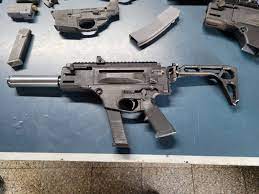The national firearms act (NFA), enacted in 1934, is an important law in the United States designed to regulate specific types of firearms and related equipment. The act was a response to the rampant usage of automatic weapons used by criminals organized during the Prohibition era, aimed at curbing violence by controlling the availability of particularly dangerous weapons.
What is the NFA?
The NFA is primarily focused on specific kinds of firearms which include the machine gun, short-barreled weapons (SBRs) as well as shotguns with short-barreled barrels (SBSs) and suppressors (also known as silencers) as well as destructive devices like grenades and bombs. Additionally, it covers any other weapons (AOW) that falls under the category of “AOW” which includes a variety of disguised or novelty weapons.
Registration and Taxation
One of the primary features in the NFA are the requirements for owners to register NFA firearms in the Bureau of Alcohol, Tobacco, Firearms and Explosives (ATF). The process of registration involves filing an application, providing fingerprints, photos as well as a thorough description of the firearm. This process aims to create an identifiable record of ownership, thereby aiding police in monitoring and regulating the distribution of these guns.
The NFA also imposes taxes on the production as well as transfer of NFA firearms. The tax amount is 200 dollars for most NFA items except for AOWs that are subject to an additional tax of $5. The financial hurdle was originally designed to be prohibitively expensive and discourage people from purchasing these weapons.
Compliance and Enforcement
To ensure compliance to ensure compliance, the NFA stipulates severe penalties for violations. The possession of firearms without registration or transfers of NFA firearms can lead to severe consequences, including hefty fines and lengthy prison sentences. The ATF is a force for good, conducting investigations and audits to ensure compliance with the law.
Impact and Controversy
Since its beginning since its inception, the NFA has faced various legal modifications and challenges. Critics argue that it infringes the Second Amendment rights and imposes unnecessary burdens for citizens who are law abiding. However, supporters contend that it is necessary for public safety, helping to prevent the misuse of dangerous weapons.
In 1968, the Gun Control Act (GCA) was passed, which widened the regulation framework set through the NFA. The GCA mandated that all firearms including NFA objects, to bear serial numbers. This made the process easier for police officers to trace guns.
Conclusion
The National Firearms Act remains a cornerstone of firearm regulation in the United States. Although it is the subject in debates, its significance in regulating circulation and possession of specific kinds of firearms is indisputable. Knowing about the NFA is crucial for anyone involved in gun ownership or advocacy, since it shapes the landscape of gun rights and regulations in the nation.
